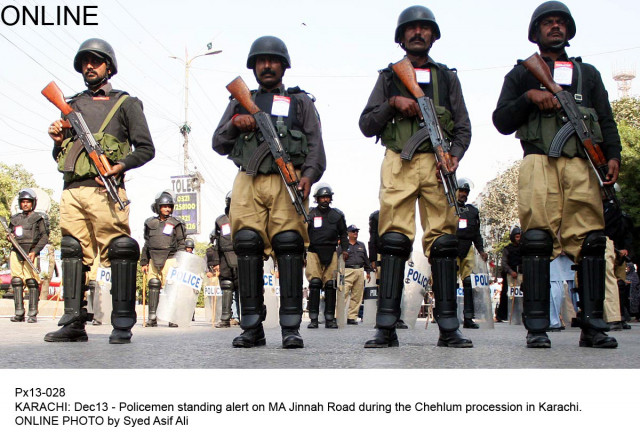Hitting the gas! Call for paradigm shift in foreign, internal security policies
‘Islamabad Declaration’ presents recommendations for countering terrorism

A file photo of Karachi police personnel
Members of the civil society organisations have called upon the state to eradicate the menace of terrorism in all its manifestations and forms.
They demanded a complete reversal of the policies of ‘strategic depth’ and ‘good Taliban, bad Taliban’ with complete cessation of its overt and covert sponsorship and support to all Taliban groups and militant outfits.
The members of the civil society were speaking at the national consultation on ‘Civil society’s role in curbing extremism and terrorism’ organised by Pakistan Civil Society Forum (PCSF) held at a local hotel here on Wednesday.
Naseer Memon, the chief executive of Strengthening Participatory Organisation (SPO), said that the country was victims of its own misplaced priorities urging to condemn and disown terrorism in all its forms. Memon said the state should adopt an unambiguous narrative on terrorism and religion should be detached from state affairs.
“All Jehadi groups must be banned forthwith,” said A.H. Nayyar, a professor at Quaid-i-Azam University, adding that if government was serious about eliminating terrorism, then it must abandon using proxy terrorists to achieve foreign policy objectives.
Human Rights Commission of Pakistan (HRCP) Joint Director Hussain Naqi recommended that the civilians should be involved in finalising national security policy.
“State shall immediately withdraw protection to extremist individuals and groups,” he said.
Prof Sarfraz Khan, director Area Study Centre at the University of Peshawar, said that developing peaceful relations with its neighbours would help eliminate terrorism from the country.
Dr Pervez Hoodbhoy, a renowned intellectual and academic, suggested that the civil society should monitor the speeches of mosque ‘khateebs’ and inform people about their thoughts.
Muhammad Tahseen, the executive director of the South Asia Partnership said that it was time the government reform policies in consultation with larger groups, including political parties and the civil society.
Naeem Mirza, chief operating officer at Aurat Foundation, said that a major institutional purge at all levels was required.
Marvi Sirmed, an activist and columnist, suggested establishing a counter-terrorism force with well-equipped and trained professionals.
The ‘Islamabad Declaration’ followed by the discussion said that citizens of Pakistan would render its fullest support to any committed drive against terrorism, extremism and de-weaponisation if the action plan by all-party parliamentary committee ensures comprehensive Madrassa reforms, ban on hate speech and material, and inclusion of Fata into mainstream legislative and constitutional orbit.
The declaration urged the state to relinquish the ‘national security state’ paradigm in favour of a ‘welfare human-security state’ which served all the citizens without special regard to any particular religion, caste, creed and gender.
The consultation called for all inclusive measures for discouraging extremism, Taliban groups and leaders, sectarian organisations, their supporters and their ideology in all public spaces, including media.
It also called for making all reports of all commissions made so far in the country on various incidents of terrorism public.
“Upholding values of justice, right to a fair trial and transparency in arrests and convictions must be ensured,” it concluded.
Published in The Express Tribune, December 25th, 2014.


















COMMENTS
Comments are moderated and generally will be posted if they are on-topic and not abusive.
For more information, please see our Comments FAQ